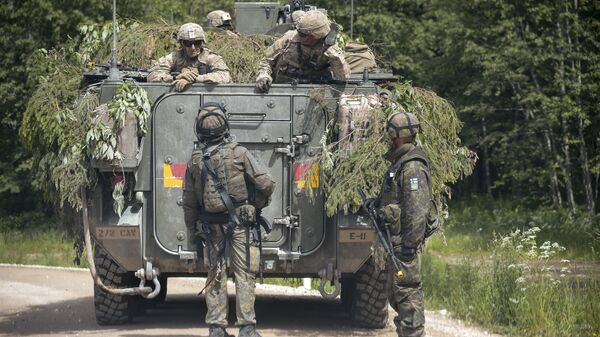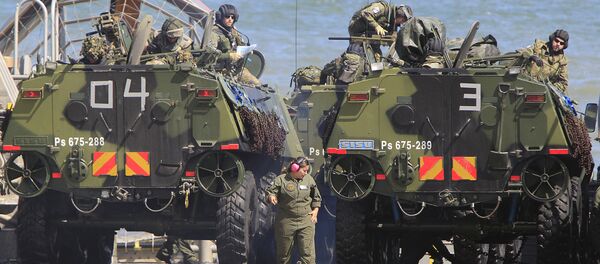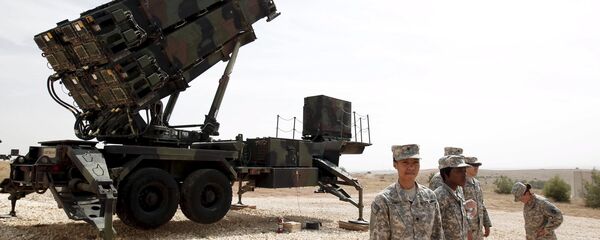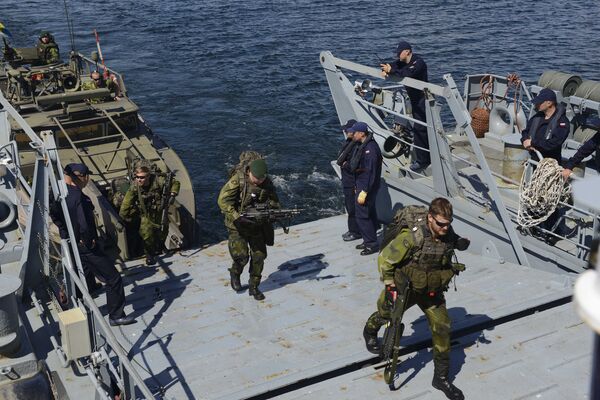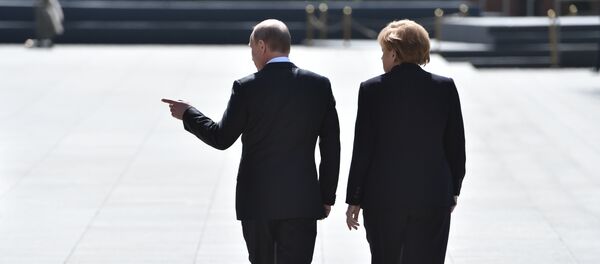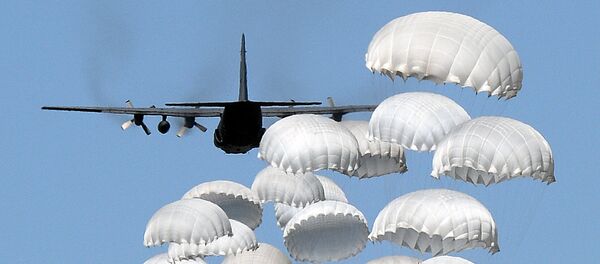A series of NATO war games in close proximity to Russia's borders as well as the Alliance's decision to deploy four battalions in the Baltic states and Poland have prompted European politicians and scholars to accuse the bloc of worse than useless muscle-flexing on Russia's doorstep.
In his June interview with the Bild am Sonntag media outlet German Foreign Minister Frank-Walter Steinmeier warned Europe and NATO against "saber-rattling and war cries."
"What we should not do now, is inflame the situation with loud saber-rattling and war cries. Anyone who thinks that symbolic tank parades on the Eastern border of the alliance create more security is mistaken," the German foreign minister stressed.
"I fully agree with him [Steinmeier]. There is a great danger in deploying American and European troops near the Russian borders, and placing a missile defense system in Romania," Teltschik underscored.
Much in the same vein, former Secretary of Defense William J. Perry is beating the drum over the looming confrontation between Russia and the West in his June report entitled "Back from the Brink: Toward Restraint and Dialogue between Russia and the West."
"Today, dialogue and restraint are needed more than ever since the end of the Cold War. In order to prevent misperceptions, miscalculations, and the potential return of a costly arms race, both Washington and Moscow have to rediscover the instruments of diplomatic dialogue, military-to-military exchanges, and verifiable arms control," Perry writes.
Addressing the eighth meeting of Russian Federation ambassadors and permanent envoys at the Russian Foreign Ministry, President Putin called NATO's decision to expand eastward "a great mistake," adding that the Alliance has been only adding fuel to the fire over recent years, instead of building a "new architecture for equal and indivisible security from the Atlantic to the Pacific" hand-in-hand with Russia.
"The number of military exercises has increased dramatically, including in the Black Sea and the Baltic Sea. We are constantly accused of military activity, but where? Only on our own soil. We are supposed to accept as normal the military build-up on our borders. Rapid reaction forces are being deployed in Poland and the Baltic countries, and there is a build-up in offensive weapons. All of this seeks to undermine the military parity achieved over a period of decades," Vladimir Putin underscored.
"However, we are not going to let ourselves get intoxicated by these military passions," the Russian President stressed, adding that those who believe that they would provoke Russia into a "costly and futile arms race" are mistaken.
"First, NATO and Russia need better conflict management," Kühn believes, specifying that both sides need to improve communications between the US Joint Chiefs of Staff, the Russian General Staff, and NATO's Supreme Headquarters Allied Powers Europe (SHAPE).
"Second, allies should aim at increasing the security of all states in the Baltic area (including Russia) by reciprocal and verifiable restraint commitments instead of solely relying on further military buildup," the German scholar continues.
Thirdly, according to Kühn, "NATO should rethink its plans for a missile defense system with elements in Romania (already operational) and Poland (under construction)."
He recalls that Washington and NATO said that a reduction in the nuclear threat from Iran to Europe would require the Alliance "to adapt its missile defenses accordingly." The Iran nuclear deal has nullified the threat. So far, "the next phase of the US Aegis Ashore missile defense system, planned for deployment in Poland by 2018, should be postponed," the scholar emphasizes.
Fifthly, the scholar writes, Washington should forego development of its new Long-Range Standoff Weapon (LRSO) — the plan that has already come under criticism in the US, most notably from Senator Dianne Feinstein (D-CA). For its part, Russia should phase out its new nuclear-armed air-launched cruise missiles, Kühn insists.
"Sixth, Washington and Moscow must work toward early discussions on a possible follow-on treaty to the New START agreement. New START expires in 2021," he highlights.
Without a new treaty Washington and Moscow could be "thrown back" to an unstable situation of "nuclear non-transparency and unpredictability," Kühn warns.
NATO and the West should start a direct dialogue with Russia, he stresses, adding that the future of the Russo-West relations largely depends on the decisions of the upcoming NATO Summit in Warsaw.
However, there are signs showing that NATO may adjust its stance toward Russia during the summit.
"This process has already been kick started. [NATO] is already discussing the possible course correction to its approach to Russia," political analyst Andrei Koshkin told Radio Sputnik, stressing that "it will take a long while for NATO to change its strategy towards Moscow completely."
